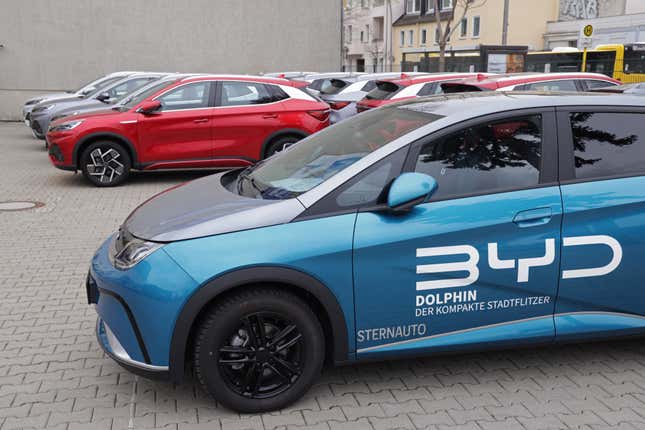
In This Story
Despite the White House and Congress’ best efforts, younger Americans are ready and willing to buy Chinese cars. Well, as soon as they’re up for sale in the United States.
Seventy-six percent of Americans under 40 years old would consider purchasing a Chinese brand vehicle, according to a new report from research firm AutoPacific that surveyed 800 U.S. respondents. Conversely, Just 26% of Americans over the age of 60 would consider buying a Chinese car.
Overall, AutoPacific found that 35% of American adults between 18 and 80 years old would consider purchasing a Chinese vehicle.
“A surprising number of American consumers are familiar with Chinese car brands even though none are sold here currently,” Ed Kim, the president and chief analyst at AutoPacific, said in a statement. “This is especially true among savvy Millennials and Gen Z, who would be the most likely to consider acquiring a vehicle from a Chinese brand.”
Although Chinese cars aren’t currently sold in the U.S. — with the exception of Polestar, a Sweden-based luxury electric vehicle brand that is owned by China’s Geely — concerns over the country’s dominance in the global auto market has emerged as a major topic for debate in the U.S.
President Joe Biden earlier this month said tariffs on some EV imports will quadruple from 25% to 100% to prevent Chinese automakers from flooding the market with cheap cars. The United States Trade Representative on Wednesday said those tariffs will take effect on August 1, setting the stage for a potential trade war.
China’s Commerce Ministry has said the tariffs will “seriously impact the atmosphere of bilateral cooperation” and threatened to “take resolute measures to defend its rights and interests.
The U.S. Department of Commerce in February announced an investigation into Chinese-made smart cars, noting that EVs and autonomous vehicles collect massive amounts of data.
About 44% of all respondents said they would be very concerned about their privacy if Chinese cars were sold in the U.S., with another 34% saying they would be somewhat concerned, according to AutoPacific. But that won’t stop Americans under 40 from considering buying one of those vehicles, despite 73% saying they would be concerned about their privacy.
“Privacy concerns about Chinese-brand vehicles are likely to eventually subside given that most of the connected smartphones, smart watches, laptops, connected home devices we are comfortable using every day are in fact manufactured in China,” Kim said.
Chinese cars — especially EVs — have a major leg up on Western competitors. Many Chinese automakers — thanks to a combination of cheap manufacturing and state subsidies — are able to sell their cars for dirt-cheap.
BYD, for example, sells the Seagull hatchback car for less than $10,000. China is also home to the cheapest electric car in the world, the roughly $1,000 Changli Freeman. Chinese cars also come with impressive technology and features that consumers demand, from better driver assistance tech to free fridges and portable rooms.
“Younger generations of shoppers are clearly aware of the enticing products Chinese automakers are cooking up overseas,” Robby DeGraff, AutoPacific’s manager of product and consumer insights, said in a statement. “It’s only a matter of ‘when’ they’ll be able to get their hands on them.”